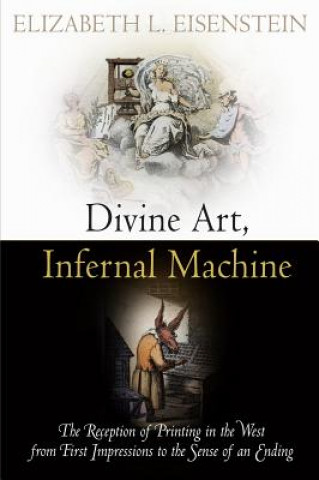
Code: 04723574
Divine Art, Infernal Machine
by Elizabeth L. Eisenstein
There is a longstanding confusion of Johann Fust, Gutenberg's one-time business partner, with the notorious Doctor Faustus. The association is not surprising to Elizabeth L. Eisenstein, for from its very early days the printing pr ... more
- Language:
 English
English - Binding: Paperback
- Number of pages: 384
Publisher: University of Pennsylvania Press, 2012
- More about this

You might also like
-

Dune
34.84 zł -33 % -

Haunting Adeline
125.81 zł -1 % -

Berserk Deluxe Volume 2
212.65 zł -1 % -

White Nights
15.40 zł -23 % -

Powerless
47.24 zł -14 % -

Atomic Habits
59.22 zł -26 % -

Dune Messiah
46.33 zł -3 % -

Berserk Deluxe Volume 3
215.07 zł -1 % -

One Day
32.63 zł -36 % -

Berserk Deluxe Volume 1
211.84 zł -2 % -

Iron Flame
62.95 zł -26 % -

Surrounded by Idiots
37.77 zł -26 % -

Harry Potter and the Prisoner of Azkaban (Minalima Edition)
170.44 zł -2 % -

Gravity Falls Journal 3
89.45 zł -

Heaven Official's Blessing: Tian Guan Ci Fu (Novel) Vol. 1
89.04 zł -1 % -

The Creative Act
100.22 zł -15 % -

Dune
47.34 zł -23 % -

Hunting Adeline
126.52 zł -4 % -

A Little Life
47.04 zł -14 % -

Children of Dune
46.73 zł -2 % -

Heaven Official's Blessing: Tian Guan Ci Fu (Novel) Vol. 2
86.73 zł -3 %
Give this book as a present today
- Order book and choose Gift Order.
- We will send you book gift voucher at once. You can give it out to anyone.
- Book will be send to donee, nothing more to care about.
More about Divine Art, Infernal Machine
You get 94 loyalty points
 Book synopsis
Book synopsis
There is a longstanding confusion of Johann Fust, Gutenberg's one-time business partner, with the notorious Doctor Faustus. The association is not surprising to Elizabeth L. Eisenstein, for from its very early days the printing press was viewed by some as black magic. For the most part, however, it was welcomed as a "divine art" by Western churchmen and statesmen. Sixteenth-century Lutherans hailed it for emancipating Germans from papal rule, and seventeenth-century English radicals viewed it as a weapon against bishops and kings. While an early colonial governor of Virginia thanked God for the absence of printing in his colony, a century later, revolutionaries on both sides of the Atlantic paid tribute to Gutenberg for setting in motion an irreversible movement that undermined the rule of priests and kings. Yet scholars continued to praise printing as a peaceful art. They celebrated the advancement of learning while expressing concern about information overload. In Divine Art, Infernal Machine, Eisenstein, author of the hugely influential The Printing Press as an Agent of Change, has written a magisterial and highly readable account of five centuries of ambivalent attitudes toward printing and printers. Once again, she makes a compelling case for the ways in which technological developments and cultural shifts are intimately related. Always keeping an eye on the present, she recalls how, in the nineteenth century, the steam press was seen both as a giant engine of progress and as signaling the end of a golden age. Predictions that the newspaper would supersede the book proved to be false, and Eisenstein is equally skeptical of pronouncements of the supersession of print by the digital. The use of print has always entailed ambivalence about serving the muses as opposed to profiting from the marketing of commodities. Somewhat newer is the tension between the perceived need to preserve an ever-increasing mass of texts against the very real space and resource constraints of bricks-and-mortar libraries. Whatever the multimedia future may hold, Eisenstein notes, our attitudes toward print will never be monolithic. For now, however, reports of its death are greatly exaggerated.
 Book details
Book details
Book category Books in English Society & social sciences Society & culture: general Cultural studies
162.18 zł
- Full title: Divine Art, Infernal Machine
- Subtitle: The Reception of Printing in the West from First Impressions to the Sense of an Ending
- Author: Elizabeth L. Eisenstein
- Language:
 English
English - Binding: Paperback
- Number of pages: 384
- EAN: 9780812222166
- ISBN: 0812222164
- ID: 04723574
- Publisher: University of Pennsylvania Press
- Weight: 608 g
- Dimensions: 229 × 158 × 24 mm
- Date of publishing: 10. September 2012
safisfied customers
Since 2008, we have served long line of book lovers, but each of them was always on the first place.
Copyright! ©2008-24 libristo.pl All rights reservedPrivacyPoučení o cookies



 21 million books
21 million books Delivery 12.99 zł
Delivery 12.99 zł (32) 444 93 66 (8-15.30h)
(32) 444 93 66 (8-15.30h)